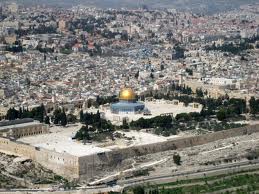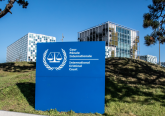
In international relations there is sometimes a situation of political make-believe whereby states conduct themselves in a manner that actively and consciously ignores reality.
On some occasions this is warranted in order to avoid a crisis or mitigate conflict. And once relevant self-deception can become ingrained after time, even though its usefulness is debatable at best. Such is the case (or perceived to be) with Israel’s capital city.
Israel’s capital is Jerusalem. The government is located there; so are the Supreme Court and the Bank of Israel. All are located in West Jerusalem, which is seen by the international community as part of Israel’s sovereign territory – and would almost certainly be so following a future peace agreement with the Palestinian Authority.
East Jerusalem is another matter. The international community objects to Israel’s official position whereby East Jerusalem is considered an integral part of a unified city under Israeli sovereignty. The status of East Jerusalem (and the West Bank), as far as the international community is concerned, ought to be negotiated between Israel and the Palestinian Authority with the aim of establishing a Palestinian state next to Israel.
However the international community explicitly accepts that West Jerusalem is part of the sovereign territory of Israel and implicitly understands that the Jewish neighborhoods in the eastern part of the city would remain under Israeli rule following a peace agreement.
Given all this, why can’t the world accept West Jerusalem as Israel’s capital? Why keep pretending that Israel either has no capital or has one in Tel Aviv?
There are some who refer to Jerusalem as ‘Israel’s self-declared capital’. But aren’t all capitals self-declared? Of course, the implied meaning is that Jerusalem is Israel’s self-declared and unrecognised capital.
After all, Jerusalem was not intended to be part of the Jewish State under the United Nations Partition Plan of 1947. So why even recognise parts of Jerusalem as part of Israel’s sovereign territory?
Well, there are other territories that were not supposed to be part of the Jewish State according to the UN Partition Plan of 1947. Whilst the Arab states and the Palestinian leadership failed to endorse the plan, these too became part of the newly created Jewish State.
This was controversial, but nevertheless the international community sees these territories as sovereign Israeli territory. So why not West Jerusalem? If the Armistice Lines of 1949 (the so-called 1967 borders) are regarded as the basis for a future settlement between Israel and the Palestinian Authority, why make a distinction between, say, Acre, Jaffa and West Jerusalem?
If logically no distinction ought to be drawn, what is the problem of recognising, or at least accepting, that West Jerusalem is Israel’s capital?
Certainly, the present situation is comfortable to all concerned except Israel – and perhaps the ambassadors who travel from Tel Aviv to Jerusalem each time they have to meet with a government official.
By pretending that Jerusalem – or at least its western part – is not Israel’s capital may be avoiding a crisis with the Arab and Muslim world. This line of thought is understandable, though peculiar. After all, most Arab and Muslim States ostensibly call for a two-state solution based on the 1967 borders. West Jerusalem would remain within Israeli sovereignty. So what is the problem, then, of recognising de jure, or at least accepting de facto, that West Jerusalem is Israel’s capital?
Dr. Yoav J. Tenembaum is a lecturer in the Diplomacy Program at Tel Aviv University. He received his DPhil from St. Antony’s College, Oxford. You can reach him at this email address.








3 Comments
Dear Yoav,
there is a significant difference, first of all, between West Jerusalem and Jerusalem (East included). The difference is one of many meanings; historically, Jerusalem was not meant to be part of Israel,let alone its capital. It was the capital of a Palestinian State. This makes it the fulcrum of any current and future Palestinian entity. As you explain, de facto Jerusalem has been controlled by the Israeli authorities over the last decades, but this does implicate that it is not any longer a constitutional part of the future Palestinian State. This is despite its Western side being under an occupation where practices of encroachment are a common trait of the urban dynamics.
In addition, Jerusalem is a foundational element of the Palestinian identity.
If the international community were to recognise it as the capital of Israel, it would be against previous international agreements, against a conspicuous part of its memebers’ rhetoric, interests and identitarian politics.
If something shall be done, that is Israel to unilaterally declare West Jerusalem its eternal capital, and East Jerusalem the capital of a future Palestinian State. And the international community would likely accept this decision and move its embassies away from Tel Aviv.
Any other decision in this respect would mean a further weakening of the international community vis à vis international norms, and could set a dangerous precedent. For instance, a consequent de jure take over of the West Bank or other territories. (although demographically speaking would be an unwise strategy).
Best regards,
Maziyar
St Antony’s College
Dear Maziyar,
Thank you very much for your detailed comments.
I don’t wish to get involved in what appears to me to be an ideologically intended discussion.
You raise some points that are inaccurate, most important you state that Jerusalem “was the capital of a Palestinian State.” Jerusalem was not the capital of a Palestinian State, as such a state has not been established, so far, and thus Jerusalem could not have been its capital.
Jerusalem, according to the UN Partition Plan of 1947, was intended to be an international entity. As a result of the war initiated by the Arab states and the Palestinian leadership, who opposed the UN Partition Plan, the city remained divided between Israel and Jordan. Only following the Six Day War, was the city re-united under Israeli control.
My intention was to employ the logic of those who are opposed to recognizing Jerusalem – any part of Jerusalem – as Israel’s capital in order to demonstrate that, even according to it, there is no reason why at least West Jerusalem should not be recognized de jure, or at least accepted de facto, as Israel’s capital.
I certainly hope that a future peace agreement can settle all outstanding problems, but my argument went beyond it.
Best wishes.
Yoav
“This line of thought is understandable, though peculiar.”
It’s hardly peculiar. There are many other examples of legal fictions designed to avoid taking sides in unresolved conflicts:
– the special status of West Berlin delegates in Federal institutions in pre-1990 FR Germany (imposed by the Allied Powers)
– the refusal to recognize “Berlin” as the capital of the GDR until 1972
– “Taiwan, Province of China” in UN terminology
– the separate representation of the Byelorussian and Ukrainian SSRs in some parts of the UN system before 1991